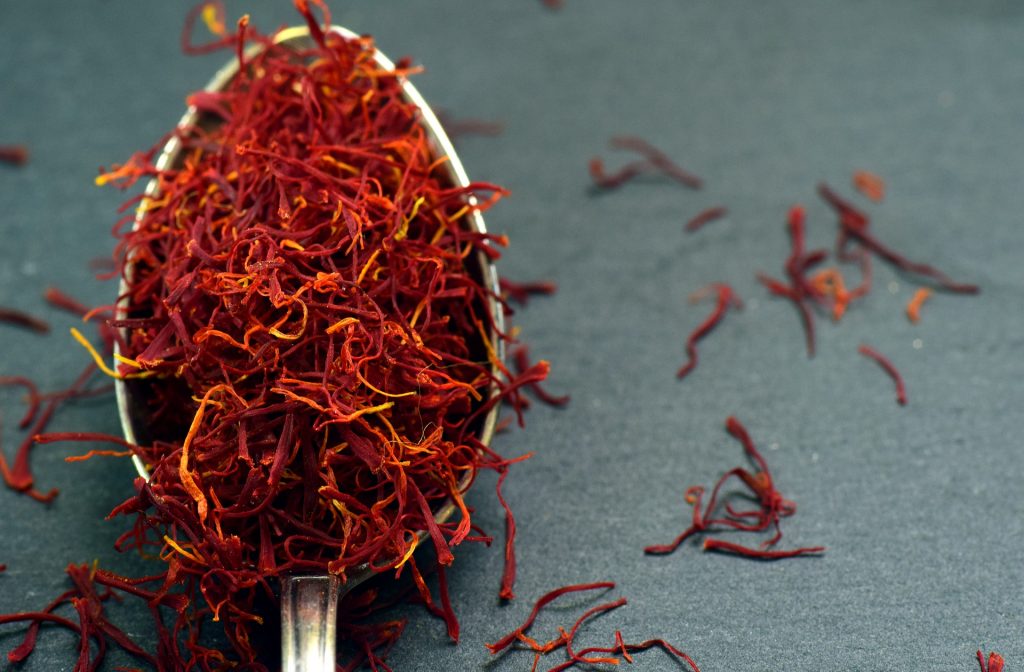Saffron: A Medicinal Spice
Saffron is a revered spice from the Middle East from the flower Crocus sativus. The spice is the delicate stigma and styles or threads found in the center of the flower that are difficult to collect. Each flower contains 3 threads of saffron and a pound of saffron is approximately 100,000 threads. As such, high quality saffron, pound per pound is often more valuable than gold (CNN 2015).

In the last twenty years, medical research has started to explore the pharmacological effects of saffron with interesting results. Initial research indicates potential antidepressant, anti-inflammatory, antioxidant, anticancer, and immune balancing properties (Moshiri 2015).
Depression and Anxiety
Probably one of the most well-studied benefits of saffron is for depression. A review in 2014 concluded that saffron had large beneficial treatment effects and was comparable to standard antidepressant medication. The review concluded that saffron may work through enhancing the neurotransmitter serotonin, along with anti-inflammatory, antioxidant and neuroprotective mechanisms (Lopresti 2014).
Another more recent review showed that saffron has efficacy in treating both depression and anxiety. In addition, saffron worked for mood and anxiety symptoms associated with premenstrual syndrome. Some of the included studies used flower petal extracts rather than threads which are cheaper and still appear to be clinically effective (Yeung 2018). They also state that side effects appear to be lower with saffron than standard drugs, but more research is necessary to fully understand the effects.
Asthma
Other research is starting to indicate saffron may have benefits for allergic asthma. Two recent human trials showed improvement in asthma with saffron (Zilaee 2019, Hosseini 2018). In mice, constituents of saffron were also shown to help control the allergic cascade (Yosri 2017, Xiong 2015).
Brain Benefits
Saffron also appears to have neuroprotective effects. A clinical trial on patients with mild cognitive impairment showed improvements with saffron, while the control group had worsening impairment (Tsolaki 2016). Another trial of moderate to severe patients with Alzheimer’s dementia showed that saffron was as effective as the standard drug memantine in reducing cognitive decline (Farokhnia 2014). A study in mild to moderate Alzheimer’s showed saffron worked better than placebo at improving cognitive function (Akhondzadeh 2010) and saffron was compared to another standard Alzheimer’s drug, donepezil and worked as well in mild to moderate Alzheimer’s disease (Akhondzadeh 2010).
Sexual Function

There’s also enough research to consider saffron a potential option for erectile dysfunction. In a systematic review of published research, all categories of sexual function increased significantly with saffron, although we still need more research on the effects of saffron on semen quality as initial data was mixed (Maleki-Saghooni 2018).
Women may also benefit from saffron for sexual health. A group of women struggling with severe depression and sexual dysfunction that were on standard medication were treated with saffron and had statistically significant improvement in arousal and lubrication with decreases in pain during sexual activity (Kashani 2012).
Eye Health
Saffron may have benefits for eye health, with a number of studies showing improvements in macular degeneration and some initial data suggesting decreased eye pressure in glaucoma (Heitmar 2019). Some evidence is starting to suggest that saffron may also help with diabetic related eye disease (Sepahi 2018).
Weight Loss
There’s been a lot of talk about saffron as a potential weight loss aid. Animal research suggests that saffron may have some benefits for weight loss, although compared to other uses, the human trial data is not great. Currently, it appears that saffron helps reduce lipids, lower blood sugar and insulin, along with potentially decreasing appetite which long term may impact weight (Mashmoul 2013). Studies that tracked weight loss directly in subjects on saffron were of low quality and only showed a trend towards weight loss that was not significant (Rahmani 2019). While weight loss is an interesting potential use of saffron, I’d really like to see long-term placebo controlled trials documenting significant results before recommending it.
Conclusion
Saffron is a revered spice and herb that has been used clinically for thousands of years. With the recent increase in research studies exploring its effects, it may soon have a place in helping to treat a number of common health conditions.




Like!! I blog quite often and I genuinely thank you for your information. The article has truly peaked my interest.